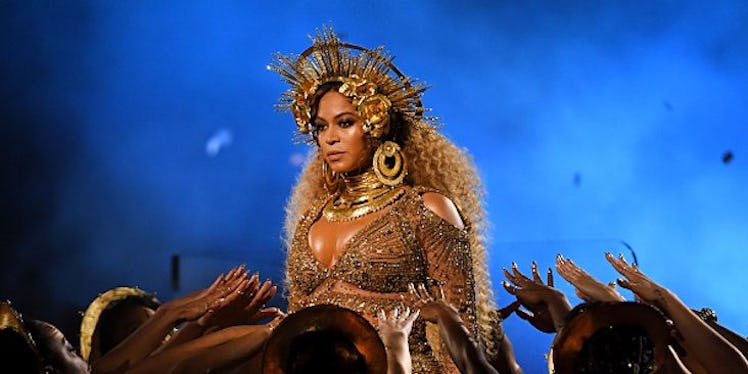
Beyoncé's Daughter Rumi Might Be Named After This Famous Persian Poet
After long, cold, hard days of speculation across the internet, we finally know that the Carters have reportedly named their twins Rumi and Sir Carter.
(Elite Daily has reached out to Beyoncé and JAY-Z's reps for confirmation, but did not hear back at the time of publication.)
Both "Rumi" and "Sir" carry rather interesting, symbolic meanings. (Would we expect anything less from Bey and Jay?) Rumi in particular is named after Jalal ad-Din Muhammad Rumi, the famous 13 century Persian poet and "mystic" whose work is known as "the roots of the roots of the roots of the (Islamic) Religion."
Rumi encourages his readers to "dissolve boundaries" between religions, says Coleman Barks, a translator who helped spark a movement for Rumi's poems to become so popular in the US. And this lesson is important now more than ever.
Barks tells the BBC,
I feel there is a strong global movement, an impulse that wants to dissolve the boundaries that religions have put up and end the sectarian violence. It is said that people of all religions came to Rumi's funeral in 1273. Because, they said, he deepens our faith wherever we are. This is a powerful element in his appeal now.
Rumi was born in 1207 in Vakhsh, a small village in what is now Tajikistan. He was a traditional Muslim preacher and scholar until he turned 37, when he met a "wandering mystic" named Shams of Tabriz and his life changed forever.
According to the Academy of American Poets, Rumi said of his meeting with Shams, "What I had thought of before as God, I met today in a human being.”
Brad Gooch, author of Rumi's Secret: The Life of the Sufi Poet of Love, says that Rumi and Shams had an "electric friendship." "Lover and beloved [or] disciple and sheikh, it's never clear," he adds. The two remained close for three to four years (there are conflicting accounts).
However, one day, Shams disappeared from Rumi's life. It is believed he either left on purpose to teach Rumi an important lesson on separation, or he was murdered by one of Rumi's jealous sons. After setting out to search for his lost friend and ultimately failing, Rumi vowed to embody Shams' "essence" through himself.
To mourn Shams' loss, Rumi write Divan-e Shams-e Tabrizi or The Works of Shams Tabriz, a collection of 40,000 odes, quatrains, eulogies, and other styles of Eastern-Islamic poetry. It is known as one of the greatest pieces of Persian literature.
In Barks' translation of this work, he wrote in the introduction, "Rumi is one of the great souls, and one of the great spiritual teachers. He shows us our glory. He wants us to be more alive, to wake up... He wants us to see our beauty, in the mirror and in each other."
Then, until his death, Rumi worked on a six-volume, 64,000-line poem called The Masnavi-ye Ma'navi (Spiritual Verses), which he dedicated to his scribe, Husam Chelebi. This work was considered by Rumi to be "the roots of the roots of the roots of the (Islamic) Religion" and is one of his most personal spiritual teachings.
"He's a poet of joy and of love," Gooch tells the BBC. "His work comes out of dealing with the separation from Shams and from love and the source of creation, and out of facing death. Rumi's message cuts through and communicates. I saw a bumper sticker once, with a line from Rumi: 'Out beyond ideas of wrongdoing and rightdoing there is a field. I'll meet you there.'"
Lee Briccetti, the executive director of Poets House, a 70,000-volume poetry library in New York City, says Rumi's poems “articulate what it feels like to be alive.” “They help us understand our own search for love and the ecstatic in the coil of daily life.”
Rumi died in 1273 in Konya, Turkey at a site that is now known as the Mevlâna museum. It's a very holy place for Muslims, but visitors of all religions check out his tomb each month to honor his legacy, especially on December 17, the anniversary of his death.